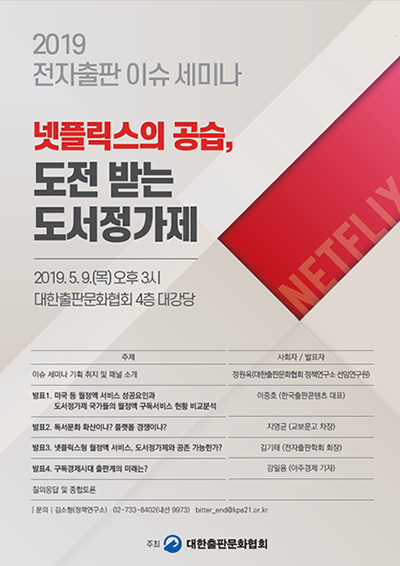|
A Diagnosis of South Korea's E-book Market Amid Subscription Competition
2019.06.10
On May 9, the Korean Publishers Association held a seminar on current issues that affect the digital publishing industry called 'The Attack of Netflix, Fixed Price System for Books Challenged'. Participants at the seminar debated whether e-book subscription services and the fixed price system for books can co-exist in South Korea. Subscription services refer to online services where members can read an unlimited number of books online after paying low monthly fees, like Netflix. Meanwhile, South Korea's fixed price regulations for book sales prevent bookstores from lowering prices beyond what publishers demand in order to protect small-to-medium sized bookstores and publishers. With the rise of these monthly subscription services, worries have been growing they may shake up the entire fixed price system altogether.
*Image of the poster for the Korean Publishers Association's 2019 seminar on e-publication issues
'Success stories of monthly subscription services in the U.S., etc. and comparisons between countries with fixed prices systems and book subscription services'
The biggest difference between the fixed book price systems in South Korea and
Lee Jung-ho, who leads Korea Publishing Contents, began his presentation by explaining the current status of subscription services for e-books outside South Korea, fixed price policies in key foreign countries and examples of fixed prices implemented in e-book subscription services. Comparisons were made between different countries and available services, with Lee detailing the main characteristics and meaning of global e-book subscription services. Lee said offshore e-book subscription services had succeeded in becoming profitable as they produced sales of content that would not have existed without subscription services and that these subscriptions made reading easy for people who had little interest in books to begin with.
'Is it the proliferation of reading culture? Or platform competition?'
Advancements in technology, improvements in profit structures,
Ji Young-gyun, who is a senior manager at Kyobo Book Centre, South Korea's largest book retail chain, explained platforms can't help but adapt to the shifts of time as the digital content market, and consumer environment have all changed. Kyobo also provides a monthly subscription service. Consumers' convenience and price are all important factors for platform providers like Kyobo, Ji said, and as consumers now stress the importance of experiential value, consumption not only means 'to own' but also 'to share'. This change in consumption patterns has given birth to the trend that is e-book subscription services and platforms that provide these services are currently competing fiercely against each other for more content to secure the market's top spot.
Can monthly subscriptions like Netflix co-exist with fixed book prices?'
Electronic publications should abide by the fixed price rule
Ahead of his presentation, Kim Ki-tae, the chairman of Korea Electronic Publishing Society, said a discussion is necessary among those who are directly affected by the fixed book price policy and e-book subscription services. He stressed the urgent need for a detailed roadmap and realistic policies. Through his presentation, Kim said if the subscription economy had previously been centered on 'content', now its core is 'digital' as technology has developed. Kim went on to point out that subscription services had manifested in a blind spot within the existing fixed price policy, creating a problem.
'What is the future of publishing in a competitive subscription economy?'
For e-books to have competitiveness in the subscription economy,
A reporter for Aju News in South Korea, Kang Il-yong projected the subscription economy would continue expanding going forward in his presentation. In his introduction, Kang said the meaning of 'subscribing' had to be clearly defined ahead of anything. 'Gudok' in Korean, which means subscription, is easily confused between subscription and curation. Subscription means paying a price for recurring services, whereas curation refers to receiving recommendation services. Kang said subscription services are more suitable for today's online and digital environments.
This year's electronic publishing issue seminar was an opportunity for all participants to mull over how the publishing industry should react to today's subscription economy. The presentations were all different, but the presenters were in agreement in that in the end, readers should be the focus of all efforts and that it is important to provide good quality content and services. Meanwhile, a more in-depth seminar on the fixed price policy and subscription services is planned for June at the Seoul International Book Fair. Not only will there be writers and other industry executives at the seminar, but also other participants from different career backgrounds, raising expectations for the discussions to be held.
Click to access the Seoul International Book Fair's website: http://sibf.or.kr/
Written by Choi Ha-Yeong Choi Ha-Yeong |
Pre Megazine
-

New Tarot Made With Korean Colors and Patterns!
VOL.69
2024.04 -

Please Look After Mom by Shin Kyung-sook
VOL.69
2024.04 -

Paper Play – A Great Way for Emotional Development, Concentration, and Creativity!
VOL.68
2024.03 -

Submit Us Your Reviews of Korean Books!
VOL.68
2024.03 -

A Miraculous Workout Routine for a Healthier Body!
VOL.67
2024.02 -

The Hottest Place in Korea, Right Here, Right Now!
VOL.66
2024.01 -

Kim Jiyoung, Born 1982 by Cho Nam-Joo
VOL.66
2024.01 -

Concerning My Daughter by Kim Hye-jin
VOL.65
2023.12 -

Bake Delicious Bread that’s Just Right for Your Taste
VOL.65
2023.12 -

Craft Your Own Special Miniature Furniture
VOL.64
2023.11 -

Take Beautiful Palace Tours With a Book
VOL.63
2023.10 -

A Guide to Beautiful Korean Handwriting
VOL.62
2023.09 -

An Offbeat Trip to Jeju Island
VOL.61
2023.08 -

Prepare for Disasters with a Single Book
VOL.60
2023.07 -

The Hen Who Dreamed She Could Fly by Hwang Sun-mi
VOL.60
2023.07 -

Feel the Street Vibes with Watercolor Painting
VOL.59
2023.06 -

Bone Soup by Kim Young-tak
VOL.59
2023.06 -

Eat Healthier and Tastier – Korean Vegan Food
VOL.58
2023.05 -

Almond by Won-pyung Sohn
VOL.58
2023.05 -

Learn About and Have Greater Fun Drinking Korean Alcohol!
VOL.57
2023.04 -

Knitting YouTuber Daeri Kim’s “Easy Modern Daily Knit”
VOL.56
2023.03 -

A New Section for Readers’ Reviews!
VOL.55
2023.02









